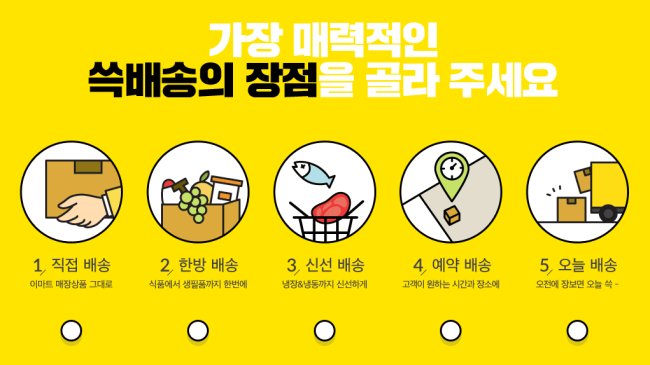[Feature] Dawn delivery takes retail industry by storm
By Kim Da-solPublished : Jan. 13, 2019 - 13:18
In recent years, South Korea’s door-to-door delivery service has evolved to allow customers to expect their parcels the very next day, or within 2 to 3 days at maximum.
While much of this dynamic still stands, e-commerce companies and retail giants have rolled out a “dawn delivery” service, striving to cut down delivery times even further.
Dawn delivery allows orders to be placed as late as midnight with deliveries guaranteed to arrive by 7 a.m. the next day. Daily necessities and perishable fresh food products are popular items for dawn delivery.
According to the industry, the dawn delivery market was valued at around 10 billion won ($8.9 million) in 2015. Although the service is currently only available in Seoul and some parts of Gyeonggi Province and Incheon due to lack of logistics infrastructure, the market value is estimated to have already reached 400 billion last year.
While much of this dynamic still stands, e-commerce companies and retail giants have rolled out a “dawn delivery” service, striving to cut down delivery times even further.
Dawn delivery allows orders to be placed as late as midnight with deliveries guaranteed to arrive by 7 a.m. the next day. Daily necessities and perishable fresh food products are popular items for dawn delivery.
According to the industry, the dawn delivery market was valued at around 10 billion won ($8.9 million) in 2015. Although the service is currently only available in Seoul and some parts of Gyeonggi Province and Incheon due to lack of logistics infrastructure, the market value is estimated to have already reached 400 billion last year.

In 2015, an online grocery startup Market Kurly first introduced the concept of dawn delivery. Its “Saetbyul delivery” delivers food products by 7 a.m. if customers order before 11 p.m.
While next-day delivery ensures the goods reach the customer within the shortest hours possible, dawn delivery sets the timeline to the very next morning.
According to Market Kurly, products are packed and dispatched from its logistics center in Songpa-gu to some 480 deliverymen by 2:30 a.m. every day. As of August last year, an average of 12,000 orders were made every day for Saetbyul delivery.
Thanks to increasing consumer demand for fresh food in the morning, the company saw 46.5 billion won in sales in 2017, about 167 percent on-year increase. It forecasts some 160 billion won in sales in the last year.
Market Kurly remains the dominant leader in the dawn delivery market, being responsible for some 79.5 percent of the relevant logistics as of August last year, according to Statistics Korea. The company has expanded its horizon by offering not only fresh food, but side dishes, home-meal replacement kits for parties and desserts.
After witnessing Market Kurly’s success, major retail companies have joined the dawn delivery race.
In October, Coupang rolled out Rocket Fresh, which ensures delivery of some 4,200 fresh food and other items by 7 a.m. on the next day. The company operates its some 3,000 deliverymen or Coupang Man into teams with different work schedules. For dawn delivery, a Coupang Man works from 10 p.m. to 8 a.m.

“We plan to expand our Rocket Fresh service to all regions across the country, even to Jeju, within this year. We will also double the selection of items,” a Coupang official said.
To do so, the company has been focusing on enlarging its logistics centers and spreading coverage nationwide. At the moment, it has dozens of logistics centers scattered around Incheon and Cheonan, covering a total of 1.1 million square meters. The company plans to double that size this year.
Last year, E-mart launched a similar offering, SSG Good Morning, with a preferred delivery window of between 6 a.m. and 9 a.m. or 7 a.m. and 10 a.m.
The company has recently secured 1 trillion won from a foreign investment firm and a private equity firm in October is to strengthen its e-commerce business. It currently runs logistics centers in Yongin and Gimpo, which are equipped with automation facilities, stock prediction and management system. The company ultimately aims to set up a system to send products here for same-day or three-hour delivery.
Saying that the future growth of his group will be led by e-commerce unit, Shinsegae Group Vice President Chung Yong-jin has set its target to increase the annual sales of its e-commerce unit fivefold to 10 trillion won by 2023.

Another retail giant, Lotte, has chosen to merge two of its affiliates to strengthen its logistics capacity.
In November, it merged its two logistics affiliates Lotte Global Logis and Lotte Logistics, giving birth to a logistics company with an annual sales of 5 trillion won and 3 trillion won of assets. It is also working to build the country’s largest logistics center in Jincheon, North Chungcheong Province.
“By locating our mega-hub logistics center on the 145,000 square meter plot of land, we can handle some 150,000 parcels on a daily basis and expand our logistics network to allow same-day delivery and several-hour deliveries,” said a Lotte official.
Meanwhile, market insiders said dawn delivery had become a costly prerequisite for retailers. The cutthroat competition in the dawn delivery market has also consistently raised questions about the hours and conditions of delivery work, pushing respective companies to adapt their shift systems.
“As there is no big difference of quality or price (of the products sold online), companies are focusing on to set up advanced storage and logistics systems for dawn delivery. But for such a system to settle, it requires a lot of money,” an industry insider from an e-commerce company told The Korea Herald.
He added that the cost of construction of logistics centers with cold chain systems, which manage stock in a temperature-controlled supply chain, begins at several hundred million won.
“One significant reason why retailers cannot expand next-morning delivery to other regions is simply because there is a lack of logistics centers and delivery trucks to look after fresh products,” said another industry insider.
“Who dominates the e-commerce market with next-morning delivery service will be a matter of which company establishes the larger logistics centers the fastest,” he added.
By Kim Da-sol (ddd@heraldcorp.com)










![[Hello India] Hyundai Motor vows to boost 'clean mobility' in India](http://res.heraldm.com/phpwas/restmb_idxmake.php?idx=644&simg=/content/image/2024/04/25/20240425050672_0.jpg&u=)








